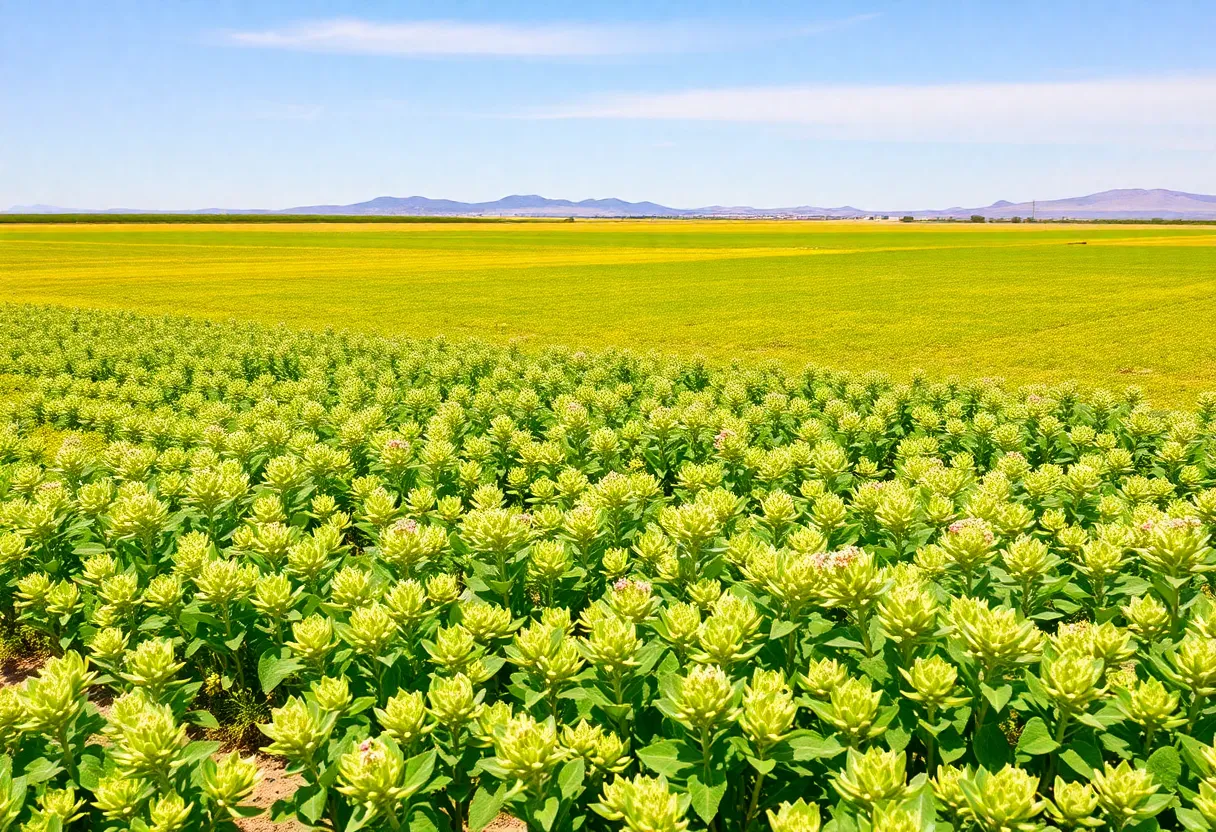News Summary
Arizona’s alfalfa farmers are facing significant challenges due to increased tariffs and water scarcity. Key buyers, like Chinese dairy farms, have reduced their purchases drastically, and rising water demand from foreign agricultural operations is raising concerns among local farmers about resource availability. As the USDA explores potential aid, the future of agriculture in Arizona remains uncertain amid these overlapping crises.
Surprising Struggles of Arizona’s Alfalfa Farmers Amid Tariffs and Water Woes
In the sun-soaked Harquahala Valley of Arizona, farmers, like Shannon Schulz, are facing a tough season as they manage their expansive fields of alfalfa hay, a vital feed for cattle. Arizona is known for its green hay fields, exporting over $100 million of alfalfa annually to international markets, especially those in the Middle East and China. But the changing culinary tides and unexpected tariffs have cast shadows over this bustling agricultural region.
Tariff Troubles
Once a booming business, particularly for growers like Schulz who diligently oversee both harvesting and exporting efforts, the alfalfa market has seen a significant slowdown. The heart of the issue lies in the retaliatory tariffs imposed during ongoing trade disputes. Chinese dairy farms, crucial customers for Arizona’s alfalfa, have cut back their purchases sharply. This is mainly due to the tariffs climbing to around 66% on U.S. exports.
China, which previously accounted for nearly half of Arizona’s alfalfa export market, has started to look elsewhere, sourcing their alfalfa from suppliers in Africa and Europe to avoid the hefty tariff burdens. This drastic shift leaves locals like Schulz worried that by the time harvest rolls around, they might end up with a product and no customers. The risk of losing a significant chunk of his business overnight is very real, and it could lead many farmers in the region down a precarious path.
Government Assistance on the Horizon?
While the outlook seems grim, there is a glimmer of hope on the horizon. USDA officials are exploring options to provide aid to farmers grappling with the impacts of these tariffs. As farmers wait for potential support, it’s clear that uncertainty looms over the agricultural landscape in Arizona. Retaliatory tariffs from Canada, Mexico, and China are disrupting trade and creating significant challenges not only for alfalfa growers but for all agricultural sectors in the state.
Moreover, increased costs for essential tools and materials due to tariffs can further complicate farmers’ operations since fertilizers and equipment have also seen price hikes.
Water Worries for Agricultural Growth
Compounding these agricultural challenges are looming water concerns. Water is a critical resource, especially for an alfalfa operation that is notably water-intensive. The state has seen the rise of foreign agricultural operations, such as Al Dahra, that are tapping into local water supplies to cultivate alfalfa. Residents of nearby Wenden harbor fears as their backyard wells face depletion due to the high water demands of such large-scale farming operations.
It’s estimated that Al Dahra might need around 15,000 to 16,000 acre-feet of water annually just to support its alfalfa farming. This potential over-extraction raises eyebrows among local farmers, who worry that state authorities might prioritize urban water needs over agricultural sustainability amid a prolonged drought.
The Need for Regulation
As the Arizona government looks into regulating groundwater usage, the enforcement of these regulations remains a grey area. The ecological effects of excessive groundwater pumping could lead to dire consequences such as falling water tables and land subsidence. The implications here affect not only farmers but the environment at large, highlighting the necessity for effective governance to protect these vital resources while balancing the needs for food production.
With all these challenges, one thing is clear: the struggles of Arizona’s alfalfa farmers are multifaceted, impacted by both domestic policies and global markets. Without efficient regulations and proper support systems, the future of farming in Arizona hangs in a precarious balance, raising questions about the sustainability of agriculture in a world facing growing climate challenges.
As local farmers push back against tariff-induced downturns and water concerns, they remain hopeful for effective solutions that will allow them to continue providing quality products while ensuring that essential resources are safeguarded for future generations.
Deeper Dive: News & Info About This Topic
- AZ Central: Trump’s Tariffs Could Hurt Arizona Farmers
- AZ Central: Arizona Farmers Fear Long-term Effects of Tariffs
- AP News: Arizona’s Water Issues Amid Alfalfa Farming
- Wikipedia: Agriculture in Arizona
- Farm Progress: Arizona Agri-Weekly on Alfalfa Conditions

Author: STAFF HERE PHOENIX WRITER
The PHOENIX STAFF WRITER represents the experienced team at HEREPhoenix.com, your go-to source for actionable local news and information in Phoenix, Maricopa County, and beyond. Specializing in "news you can use," we cover essential topics like product reviews for personal and business needs, local business directories, politics, real estate trends, neighborhood insights, and state news affecting the area—with deep expertise drawn from years of dedicated reporting and strong community input, including local press releases and business updates. We deliver top reporting on high-value events such as the Waste Management Phoenix Open, Cactus League Spring Training, and Arizona State Fair. Our coverage extends to key organizations like the Greater Phoenix Chamber of Commerce and Visit Phoenix, plus leading businesses in technology and healthcare that power the local economy such as Intel and Banner Health. As part of the broader HERE network, including HERETucson.com, we provide comprehensive, credible insights into Arizona's dynamic landscape.





